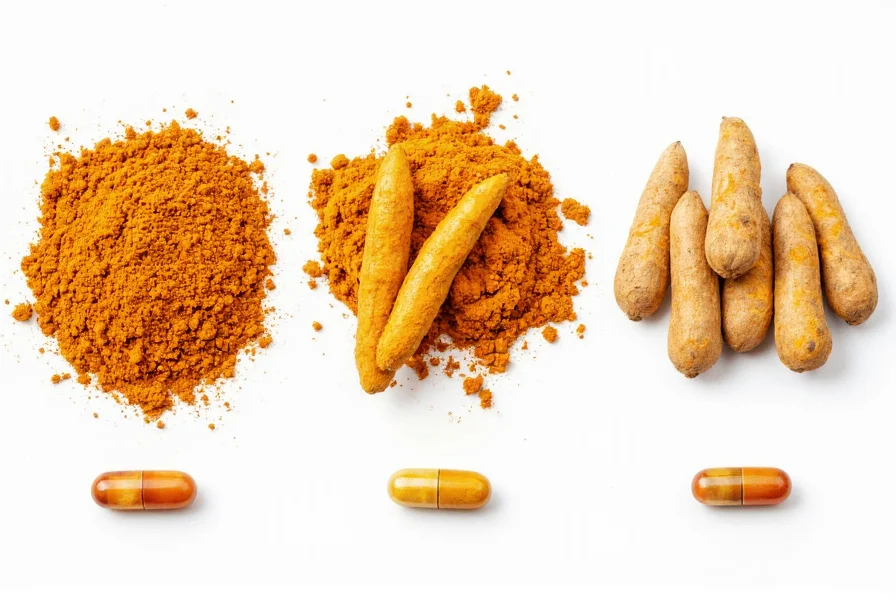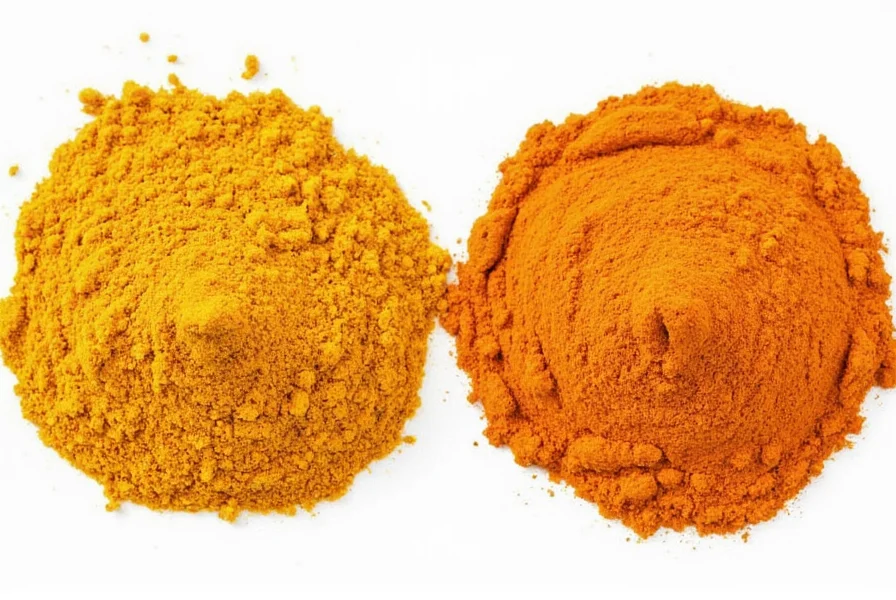Understanding the distinction between turmeric and curcumin is essential for making informed decisions about dietary supplements and natural remedies. Many consumers mistakenly use these terms interchangeably, potentially misunderstanding product labels and research findings. This comprehensive guide clarifies the scientific relationship between these two closely related but distinctly different substances.
What Exactly Is Turmeric?
Turmeric (Curcuma longa) is a perennial plant in the ginger family native to Southeast Asia and India. The part used medicinally and culinarily is the rhizome, or underground stem, which is boiled, dried, and ground into the familiar yellow-orange powder. This spice has been used for over 4,000 years in Ayurvedic medicine and traditional Chinese medicine for its purported anti-inflammatory and antioxidant properties.
Whole turmeric contains more than 100 different chemical compounds, including:
- Curcuminoids (3-6% by weight)
- Volatile oils (3-7%)
- Proteins (6-8%)
- Sugars (3-7%)
- Dietary fiber (60-70%)
| Component | Percentage in Turmeric | Key Compounds |
|---|---|---|
| Curcuminoids | 2-8% | Curcumin (77%), demethoxycurcumin (17%), bisdemethoxycurcumin (3-6%) |
| Volatile Oils | 3-7% | Turmerone, atlantone, zingiberene |
| Dietary Fiber | 60-70% | Cellulose, hemicellulose |
| Proteins | 6-8% | Diverse plant proteins |
Demystifying Curcumin: The Golden Compound
Curcumin (diferuloylmethane) is the most studied curcuminoid in turmeric, representing approximately 77% of the curcuminoid content. Scientific research has primarily focused on curcumin due to its potent biological activities, including antioxidant, anti-inflammatory, and potential neuroprotective effects. However, curcumin alone doesn't represent the full spectrum of turmeric's phytochemical profile.
When researchers investigate the difference between turmeric and curcumin, they're examining a whole food versus one of its isolated components. This distinction matters significantly when interpreting clinical studies and determining appropriate usage.
Scientific Evidence: Health Benefits Compared
Understanding is curcumin the same as turmeric requires examining how each performs in research settings:
Anti-Inflammatory Effects
Multiple studies indicate curcumin has stronger anti-inflammatory properties than whole turmeric due to its higher concentration. A 2017 review in Food Science & Nutrition found curcumin supplements demonstrated more consistent anti-inflammatory effects than turmeric powder, though whole turmeric may offer synergistic benefits from other compounds.
Bioavailability Challenges
Both turmeric and curcumin face significant bioavailability challenges. Curcumin has extremely low absorption rates when consumed alone—only about 1% enters the bloodstream. This explains why many turmeric root vs curcumin supplement comparisons show supplements often include absorption enhancers like piperine (from black pepper) or lipids.
Research published in Advances in Experimental Medicine and Biology indicates that combining curcumin with piperine can increase its bioavailability by up to 2,000%. Whole turmeric naturally contains some compounds that may modestly improve curcumin absorption, but not to the same extent as formulated supplements.
Practical Guidance for Consumers
When deciding between turmeric and curcumin products, consider these evidence-based recommendations:
For Culinary Use
Use whole turmeric powder in cooking to benefit from the full spectrum of compounds. Pair it with black pepper and healthy fats (like olive oil or coconut milk) to enhance curcumin absorption. The traditional Indian practice of making "golden milk" follows this principle.
For Targeted Health Support
When seeking specific therapeutic effects studied in clinical trials, standardized curcumin supplements (typically 95% curcuminoids) with bioavailability enhancers may be more appropriate. Look for products specifying the formulation (e.g., curcumin with piperine, phytosome-bound curcumin, or nanoparticle formulations).

Safety Considerations
Both turmeric and curcumin are generally recognized as safe when consumed in food amounts. However, high-dose curcumin supplements may cause gastrointestinal issues in some individuals. The European Food Safety Authority established an acceptable daily intake of 0-3 mg per kilogram of body weight for curcumin.
People taking blood thinners or diabetes medications should consult healthcare providers before using high-dose curcumin supplements, as they may interact with these medications. Whole turmeric in culinary amounts typically doesn't pose these concerns.
Conclusion: Making Informed Choices
The turmeric versus curcumin debate ultimately centers on understanding that turmeric is the whole plant material while curcumin is its most researched component. Neither is inherently "better"—they serve different purposes. Culinary use benefits from whole turmeric's complex phytochemistry, while targeted therapeutic applications often require standardized curcumin formulations to achieve effective concentrations.
When evaluating products, check labels carefully: "turmeric extract" may contain varying curcumin concentrations, while "standardized to 95% curcuminoids" indicates a concentrated extract. Understanding these distinctions helps consumers navigate the difference between turmeric and curcumin supplements effectively.
Frequently Asked Questions
Can I get enough curcumin from turmeric in my diet?
Typical dietary turmeric provides only 20-30mg of curcumin per teaspoon, while most clinical studies use 500-2,000mg daily. You would need to consume 15-25 teaspoons of turmeric powder daily to match therapeutic doses, which isn't practical or advisable due to potential gastrointestinal effects.
Why do curcumin supplements often include black pepper?
Piperine in black pepper inhibits enzymes that break down curcumin in the liver and intestines, increasing its bioavailability by up to 2,000%. This addresses curcumin's naturally poor absorption—only about 1% of consumed curcumin enters the bloodstream without enhancement.
Are there benefits to whole turmeric that isolated curcumin doesn't provide?
Yes, turmeric contains other curcuminoids (demethoxycurcumin and bisdemethoxycurcumin) plus volatile oils like turmerone that may have complementary health effects. Some research suggests these compounds work synergistically, though curcumin remains the most extensively studied component.
How do I choose between turmeric and curcumin supplements?
Choose whole turmeric powder for culinary use and general wellness. Opt for standardized curcumin extracts (with bioavailability enhancers) when seeking specific therapeutic effects documented in research. Always check for third-party testing certifications to ensure product quality and accurate labeling.











 浙公网安备
33010002000092号
浙公网安备
33010002000092号 浙B2-20120091-4
浙B2-20120091-4